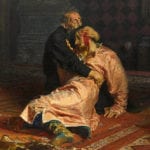 Mysteries
Mysteries  Mysteries
Mysteries  History
History 10 Surprising Stories About the Texas Rangers
 Humans
Humans 10 Philosophers Who Were Driven Mad by Their Own Theories
 Miscellaneous
Miscellaneous 10 Video-Game-Worthy Weapons and Armors from History
 Weird Stuff
Weird Stuff 10 Psychics Who Accurately Predicted Wartime Events
 The Arts
The Arts 10 Pieces of Art Inspired by a Broken Heart
 Health
Health 10 Science Fiction-Sounding New Medical Treatments
 History
History 10 Surprising Facts About the Father of Submarine Warfare
 Space
Space Ten Astonishing New Insights into Alien Worlds
 Weird Stuff
Weird Stuff 10 Bizarre Summer Solstice Rituals Still Practiced Today
 Mysteries
Mysteries Top 10 Haunting Facts About the Ghost Ship MV Alta
 History
History 10 Surprising Stories About the Texas Rangers
 Humans
Humans 10 Philosophers Who Were Driven Mad by Their Own Theories
Who's Behind Listverse?

Jamie Frater
Head Editor
Jamie founded Listverse due to an insatiable desire to share fascinating, obscure, and bizarre facts. He has been a guest speaker on numerous national radio and television stations and is a five time published author.
More About Us Miscellaneous
Miscellaneous 10 Video-Game-Worthy Weapons and Armors from History
 Weird Stuff
Weird Stuff 10 Psychics Who Accurately Predicted Wartime Events
 The Arts
The Arts 10 Pieces of Art Inspired by a Broken Heart
 Health
Health 10 Science Fiction-Sounding New Medical Treatments
 History
History 10 Surprising Facts About the Father of Submarine Warfare
 Space
Space Ten Astonishing New Insights into Alien Worlds
 Weird Stuff
Weird Stuff 10 Bizarre Summer Solstice Rituals Still Practiced Today
10 Great Performances from the BBC Proms
The BBC Proms are a British institution. Every summer, for eight weeks, some of the best classical music can be seen in London for a very reasonable price, or on TV in your own home. They were started in 1895, with the express purpose of introducing the public to classical and modern music in a more informal atmosphere than most concerts. This list contains some of the best of these great performances.
A monumental and popular piece of classical music, the 1812 Overture is perfectly suited for the Proms. The piece was written by Tchaikovsky in 1880, who planned its performance minutely. However, various events occurred which mean it is entirely possible that Tchaikovsky never heard the work as he wrote it. The piece commemorates the French invasion, and Russian repulsion of Napoleon, of 1812. The work includes a portion of La Marseillaise to represent the French, only to drown it with the famous cannon shots later. The ringing church bells at the end toll at the final victory of the Russians. The grandeur of the Albert Hall is suitable setting for so grand a piece of music.
It was a close tie between including Jupiter or Mars from Holst’s Planets suite. In the end I chose Jupiter because this performance is so superb. The orchestra maintains a playful air, necessary for a piece with the subtitle ‘Bringer of Jollity,’ but also finds the solemnity for the slower portion. Written between 1914-1916, the suite includes all the planets of the solar system then known, Pluto being discovered in 1930. When Pluto was downgraded to a dwarf planet Holst purists celebrated that the suite was once again complete. Considering the time it was written, it is fitting that the hymn ‘I vow to thee, my country’ has been arranged to this piece.
This entry may surprise some people. The Proms have always embraced innovation. Is a ukulele orchestra fitting for a classical music setting? Is Teenage Dirtbag suitable for the Royal Albert Hall? Who cares? It’s witty and entertaining, and in the Proms that is of paramount importance. Recent Proms have seen evenings dedicated to the music of Dr Who, Film music and the works of Stephen Sondheim. The Ukulele Orchestra of Great Britain have toured world wide and perform their covers of famous songs. Hearing Kate Bush’s Wuthering Heights sung by a deep voiced Yorkshire man is a particular joy.
Continuing on the more light hearted nature of the Proms is this performance of Arnold’s A Grand, Grand Overture. The piece requires three vacuum cleaners, a floor polisher and four rifles. Where but the Proms can you see TV naturalist and national treasure David Attenborough earnestly playing an upright floor polisher before being shot? While it should be absurd to include such whimsical ‘instruments’ they do play an important role in the piece. This piece punctures the stuffy image of classical music, being by turns amusing, stirring and ridiculous.
But the Proms are not purely about toying with classical music and its public perception. It offers the public the chance to see world class performers playing great music at a reasonable price. This piece was composed by Rachmaninov as he recovered from a deep depression. What could be more serious than a melancholy Russian? The piece starts with heavy, slow, tense notes before finding the theme which will hold this concerto together. Rachmaninov may not be an ‘easy’ composer for the casual listener of classical music, but this piece is particularly moving. So moving that the second movement was pilfered to provide the backbone of Eric Carmen’s All By Myself.
The video above is of the fourth movement, possibly Mahler’s most famous, but I encourage you to listen to the whole work. There is no need to be snobby, however, and if you find that you can’t get through the whole symphony listen to whatever parts you enjoy most. Even hardcore classical events often play the fourth movement in isolation, so the Proms offer rare opportunities to listen to complete symphonies. Since every Prom is a sell-out event, it shows there is public hunger for intense music.
The Great Organ of the Royal Albert Hall was once the largest in the world, so a piece which shows it off to some extent was in order. Saint-Saens considered this symphony to be his best achievement and much of his earlier work can be heard in it throughout. I have never heard the piece performed live but apparently the lowest notes of the organ, almost inaudible, give a thrilling sensation.
Simply put – this is one of the most beautiful arias ever composed and, this, one of the finest performances of it. Also known as ‘Dido’s Lament’ it is the final aria from Purcell’s opera ‘Dido and Aeneas’ which tells of the epic love affair between Carthage and Rome. However, you need not have memorized the Aeneid to appreciate the emotion in Dido’s plea to her departing lover; “Remember me, but ah! forget my fate.” Committing suicide, Dido is remembered, but by the chorus and not the man she loved. Sarah Connolly sings the aria with clear emotion and without the artifice of some other more classical opera singers.
The last night of the Proms is known for putting on big, bold pieces of music that fill the hall. It is also known for a certain strain of jingoism and plays up to it. Certain pieces of music are required by the last night, or I suspect the crowd would go on a flag-wielding riot. The last night features performances of Jerusalem, God Save the Queen, Land of Hope and Glory and (of course) Rule Britannia. Elgar’s marches speak of the Edwardian British Empire when imperial pink covered a quarter of the globe. The confidence of the era sounds in every note. It is sure to get the Union Jacks waving.
This song, popular ever since it appeared in a court pageant about Alfred the Great, in 1740, is instantly recognizable. This video marks the second appearance of Sarah Connolly. She lends the song a lightness of touch and witty interpretation. What might be an over-the-top hymn to past glories becomes a fond in-joke. When she flourishes her ‘sword’ I defy you not to laugh.
This year’s last night of the Proms was on September 10th. It included songs from such disparate sources as Wagner’s Götterdämmerung and ’The Sound of Music.’
If this list has left you cold, or you do not enjoy classical music, have a quick watch of this short lecture. TED conferences are widely available online and are designed to disseminate ‘ideas worth spreading.’ Hopefully this one will be of interest.








